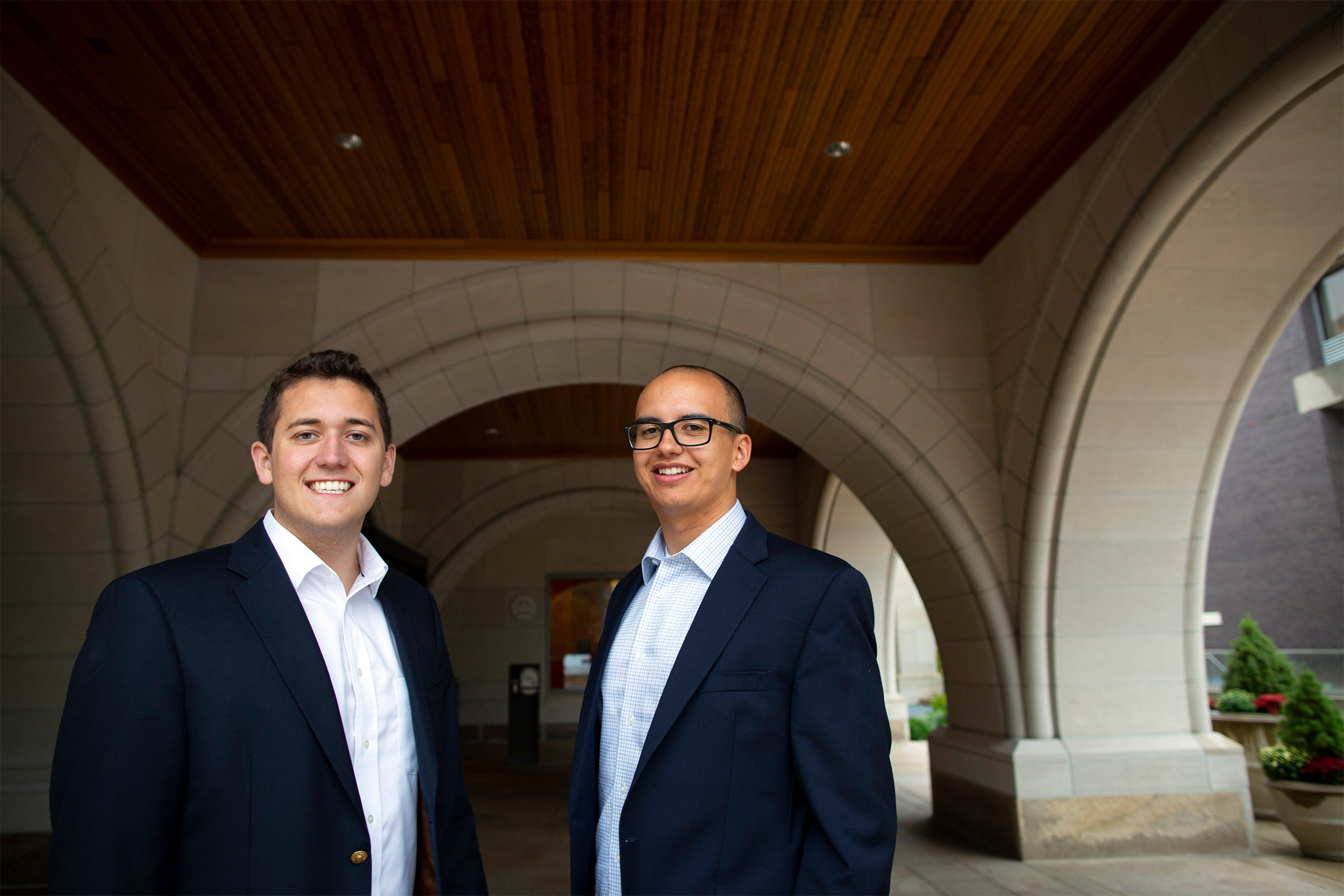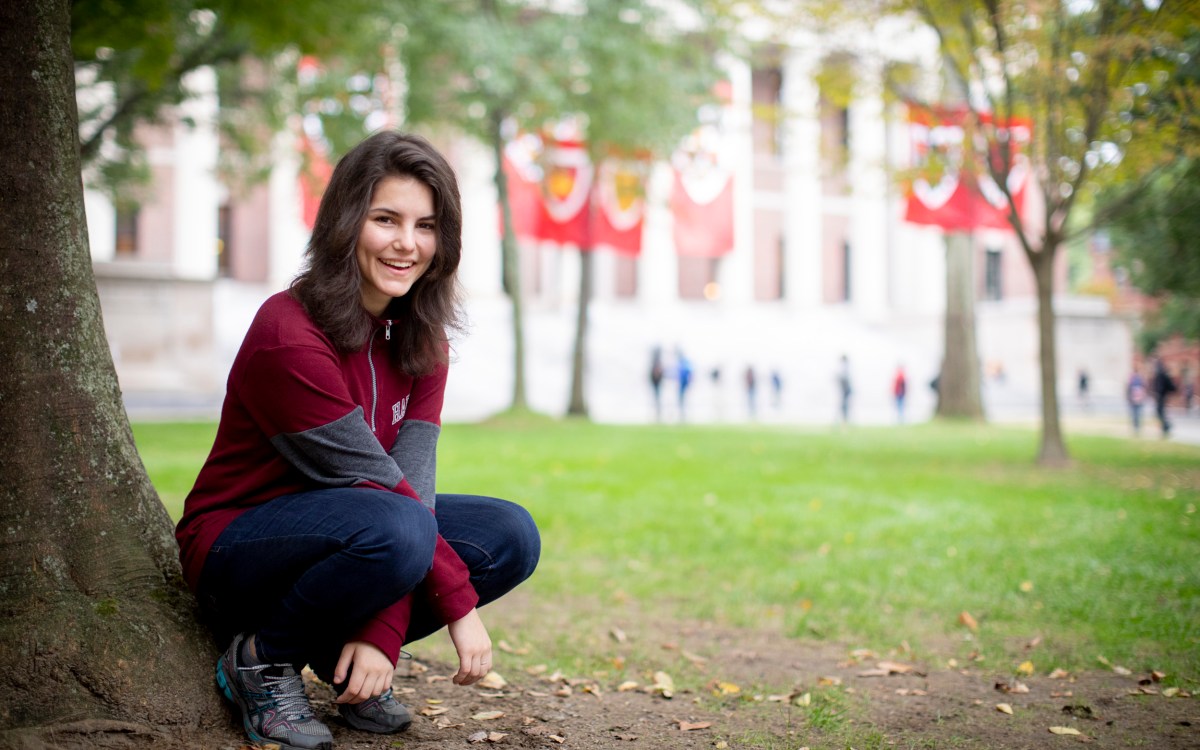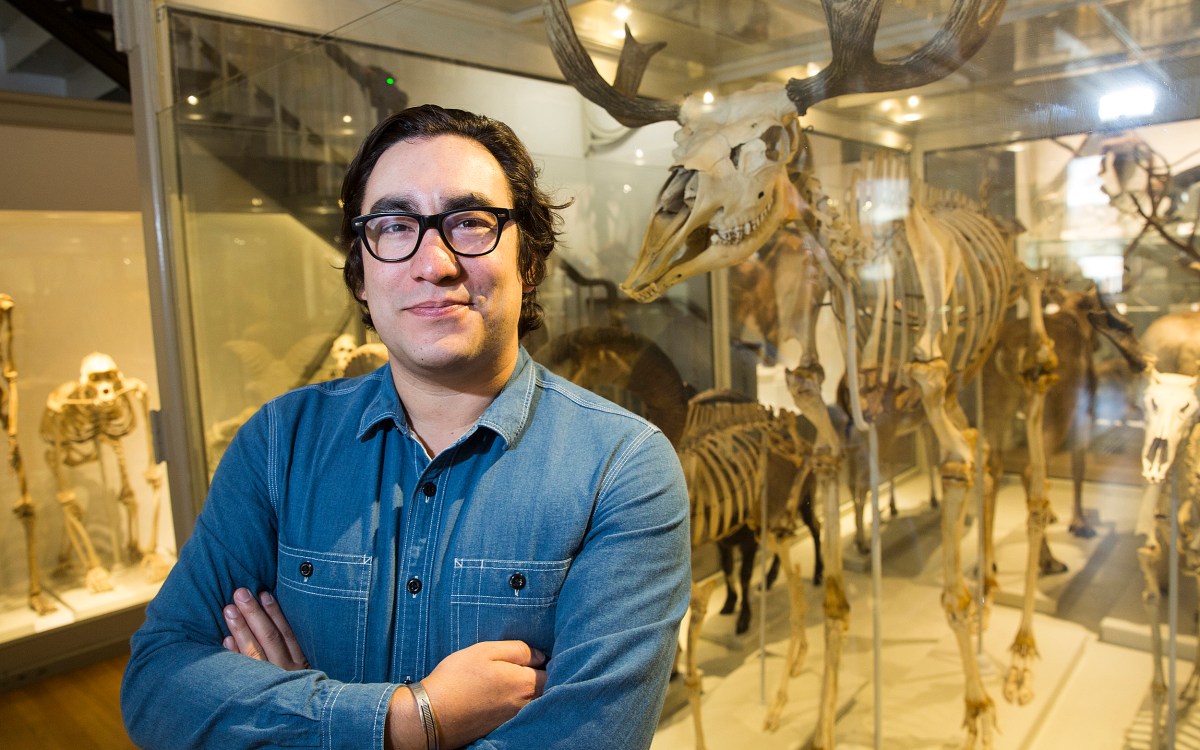
For Law School students Chance Fletcher (left) and Connor Veneski, their Native American heritage is just one piece of their identities, which also include working-class backgrounds and rural roots.
Stephanie Mitchell/Harvard Staff Photographer
For Native Americans, a duo represents
Law School students want to blaze trails for those who will follow
There are many things in common between the students from Yuma, Ariz., and Oologah, Okla. They both grew up in small towns in rural America. They were both raised by working-class parents. They both have Native American ancestry. And they both ended up at Harvard Law School.
Connor Veneski ’21 is a member of the Cayuga Nation of New York but grew up in the Fort Yuma Reservation in Arizona, home of the Quechan tribe. Chance Fletcher ’21 grew up in Oklahoma and is a member of the Cherokee Nation.
At Harvard, Native Americans make up 2 percent of enrolled students. At Harvard Law School (HLS), the two are groundbreakers. A graduate of Haskell Indian Nations University in Lawrence, Kan., Veneski is the first student admitted to the Law School from a tribal university. Fletcher, who graduated from Princeton University earlier this year, is the first recipient of the American Indian College Fund Law School Scholarship.
Their journeys from the heartland to Cambridge underscore their own efforts and those of a network of Native American practitioners and scholars committed to supporting Native American higher education.
For Shelly Lowe, executive director of Harvard University Native American Program (HUNAP), both students’ stories are remarkable. “In Connor’s case, the fact that he comes from a tribal university to Harvard Law School is something we haven’t seen before,” she said. “And Chance, who came from Princeton, has a scholarship that is being funded by an alum who wants to help Harvard train future lawyers in Indian law.”
Only 14 percent of Native Americans have a college degree, and for many of them college is not on the radar. The stories of Veneski and Fletcher illustrate that reality. Veneski applied to Haskell after he couldn’t get into the Marines, and he only thought about applying to the Law School when a Haskell professor prodded him to do it. In Fletcher’s case, a tribal councilwoman encouraged him to consider applying to Ivy League schools, and provided him with advice and connections as he applied to Princeton.
Although college already has changed their lives, law degrees will help them improve the lives of their communities, they said. “I wanted to be a social worker to help people,” said Veneski, “but as a lawyer, I can help more. I can make changes in the law and affect structural changes.” Fletcher said he is interested in “the legal interplay between tribal nations and the federal and state governments.”
For both students, their Native American heritage is just one piece of their identities, which also include working-class backgrounds and rural roots.
“I wasn’t raised as a traditional Cherokee,” said Fletcher, “but in high school my tribal councilwoman brought me into the fold. We have a rich history and culture. We’re a great community, and a proud nation.”
Veneski, who has Cayuga ancestors on his mother’s side, grew up in the Fort Yuma Reservation, where his mother is a health services administrator.
“Having grown up with Native Americans that are not my original tribe, I have a pan-Indian feeling,” said Veneski. “I feel the pulls and tensions of the different tribes. But we all share a history of oppression and injustice, a deep connection to nature, and the tenet that community is more important than the individual person.”
Both Veneski and Fletcher, who are part-white and part-Native American, explored their indigenous roots in their college years. While attending Haskell, Veneski, whose mother is also half-Puerto Rican, overcame challenges to his identity — some peers said he was not native enough — and embraced his heritage with all its nuances. Fletcher’s father’s family descends from the Cherokee Nation.
At Princeton, Fletcher co-founded Natives at Princeton and was the first Native American class president. In his junior year, he hiked the “Trail of Tears,” which marked the forced removals of Native Americans from their ancestral homelands to make way for white settlers. Fletcher trekked nearly 1,000 miles from Red Clay State Park, Tenn., to Tahlequah, Okla.
He felt changed by the arduous, monthlong experience because it allowed him to connect with his heritage, to reflect on the “gravity and the historic trauma” endured by his ancestors, and to help him ground himself.
“People were very generous with me, allowing me to camp in their backyards,” said Fletcher. “The treatment I received was the opposite of the hostility my ancestors experienced.”
After Law School, Veneski and Fletcher plan to use their degrees to give back and to set an example for Native Americans pursuing higher education.
“Many Native American kids don’t know even consider college as an option,” said Fletcher, who majored in history at Princeton and plans to go back to Oklahoma after getting some work experience on the East Coast. “Hopefully, I can be a good ambassador, and later on some Native American kid will learn about my story and say, ‘Hey, I want to do that; I want to be like him.’”
Veneski plans to work as a military defense lawyer. His father is a Marine Corps veteran, and Veneski said he has great respect for servicemen and -women. In the meantime, he hopes to become an example for Native American students from tribal universities. “I’d like to make sure that they can do it too,” he said. “I’d like to tell them that they shouldn’t be afraid to dream.”







